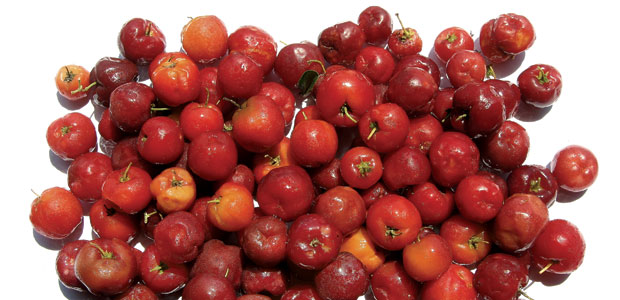Advertisement
The Real Vitamin C
As Mother Nature Intended

Whole fruits and vegetables contain inherent cofactors that work together to facilitate absorption of nutrients. One such fruit is acerola–a naturally bioavailable source of vitamin C.
Acerola (Malpighia emarginata), also known as Barbados cherry, is remarkably rich in vitamin C, carotenoids, and bioactive flavonoids, each possessing strong antioxidant capacity. This unique combination of antioxidant nutrients makes acerola a preferred source of supplemental ascorbic acid.
Vitamin C All-Star
Acerola is not a true cherry but is a drupe (or stone fruit). As much as 4 percent of acerola’s fresh weight is ascorbic acid. This translates to more than 1,600 mg of vitamin C per 100 g of raw acerola, a concentration far exceeding other fruits such as kiwi, orange, lemon, papaya, and strawberry.
The immature fruit has the highest concentration of vitamin C and is characterized by a green colour. As acerola matures to a reddish colour, vitamin C content decreases, but total antioxidant capacity increases almost twofold. This increase is due to the almost fourfold increase in total carotenoid content with advanced ripening. In fact, acerola contains more than 17 different carotenoids.
Synergistic Benefits
Nobel Prize winner Dr. Szent-Gyorgyi first realized the powerful synergy between vitamin C and flavonoids in medical applications. Additional examples of interactions between vitamin C and flavonoids and between vitamin C and vitamin E show the value of a complete antioxidant vitamin mixture.
Acerola, more than any other fruit or vegetable, provides the optimal blend of high quality, bioactive, and bioavailable vitamin C, stabilized with nature’s own preservatives.
In addition to vitamin C, acerola is a source of other vital nutrients. Low-temperature drying of acerola has been shown to preserve the vitamin C, nutrient, and carotenoid content.
Natural is Better
Unlike synthetic ascorbic acid, which contains no inherent cofactors to aid absorption of nutrients, vitamin C from whole foods is naturally bioavailable. Acerola’s uniquely high ascorbic acid content, paired with the synergistic effect of nature’s stabilizers (bioflavonoids and carotenoids), makes it a preferred source of vitamin C.
For further information on the health benefits of acerola or any other whole food, contact your natural health practitioner or local health food store.
Nutrient Content of Acerola
- NutrientAmount (per 100 g)
- Vitamin C 1,677.6 mg
- Vitamin A 767 IU
- Potassium 146 mg
- Magnesium 18 mg
- Calcium 12 mg
- Phosphorus 11 mg
Source: United States Department of Agriculture Nutrient Data Laboratory




